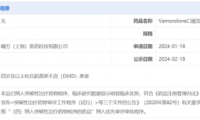-
WuXi Biologics Recognized as Both Industry and Regional ESG Top-Rated Company by Morningstar Sustainalytics
- Source: drugdu
- 294
- February 23, 2024
-
Navigate Pharma Trade with Ease – Essential Websites & Tools for Success
- Source: drugdu
- 529
- February 22, 2024
-
Pain-Free, Low-Cost, Sensitive, Radiation-Free Device Detects Breast Cancer in Urine
- Source: drugdu
- 407
- February 22, 2024
-
Wireless Hepatitis B Test Kit Completes Screening and Data Collection in One Step
- Source: drugdu
- 480
- February 22, 2024
-
WuXi Advanced Therapies’ Philadelphia Site Approved by FDA to Start Manufacturing Iovance’s Melanoma T-cell Therapy
- Source: drugdu
- 510
- February 22, 2024
-
Adverse Event Prompts FDA Hold on Tests of Drug in Atopic Dermatitis & Asthma
- Source: drugdu
- 437
- February 22, 2024
-
Sperogenix Therapeutics introduced for US$124 million! New drug for Duchenne muscular dystrophy planned to be included in priority review
- Source: drugdu
- 361
- February 22, 2024
-
AstraZeneca’s Tagrisso combination approved by FDA for advanced lung cancer
- Source: drugdu
- 548
- February 22, 2024
-
ABPI publishes new prescribing support guide for healthcare professionals
- Source: drugdu
- 367
- February 22, 2024
your submission has already been received.
OK
Subscribe
Please enter a valid Email address!
Submit
The most relevant industry news & insight will be sent to you every two weeks.

















